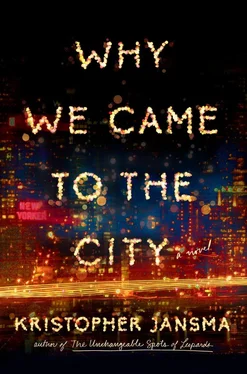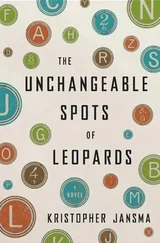Oliver had promised to get Jacob back on days just as soon as things quieted down (i.e., when Ella went back to school). Jacob didn’t hold it against him, but he worried that their time apart didn’t seem to be doing Oliver much good. He was increasingly despondent even on weekends. They still had sex in the morning on Saturday, and after that he seemed interested only in the television. Jacob sat through some political chatter about the Chelsea Clinton wedding. Oliver got a little choked up at the “candid” photos of old family moments: Bill and Chelsea and Socks watching a movie at the White House, Chelsea walking through an African village with her mother and making funny fish faces at her father.
“They’re so sweet together,” Oliver said.
“I guess,” Jacob replied. He wasn’t really paying much attention, flipping openly through the collected Keats, trying to choose which poem to excise when Oliver next went to the bathroom.
“I always wanted to have a daughter,” Oliver said, searching the cracks in the ceiling.
“Hmmm,” Jacob said, temporarily distracted by a commercial for the Stone Culligan movie. Had they really named it “Death Be Not Proud”? There ought to be a law.
Oliver trimmed his toenails, which he knew Jacob disliked witnessing, then changed the channel to BBC America, where an episode of Coupling was on.
Jacob watched as much as he could stand of the perilous minutiae of modern quirky relationships — about ten minutes — before he complained. “Can we watch something else?”
“I like this show.”
“You’re not even laughing!”
“I don’t laugh at everything I like.”
“It’s a situation comedy. You’re supposed to laugh at the hilarious situations they’re in.”
“I’m laughing on the inside.”
“Hilarity isn’t a cerebral thing, Oliver. You can’t wryly observe hilarity.”
“ I can,” he said simply. Someone on the show walked out of a closet without clothes on.
“HA HA HA HA HA,” Oliver said.
Jacob smacked him with a pillow, and Oliver pinned him against the mattress, and they ended up having sex again. Afterward Oliver changed the channel to a nature show — a peace offering that kept Jacob in bed through lunchtime (cold cereal and half a banana, still in bed) — and they talked for a while about the oceans. Stunning, alien creatures that inhabited the depths. The British documentarian explained the reproductive cycle of the common Sydney, or gloomy, octopus. A little baby octopus floated there on the screen, about the size of a quarter, with pinkish flesh so translucent that a red lump of a brain was visible, floating behind its eyes.
Oliver began sniffling.
“It looks like a Martian from some crap B movie! Why on earth are you crying?”
“Look how small it is. You can literally see the big black ocean right through it! And the parents don’t stick around to teach them how to survive out there. They just know .”
“It’s an arthropod, Oliver. You are projecting onto an arthropod.”
“Octopuses,” Oliver sniffed, “are ceph alopods. And they are highly intelligent creatures. They are one of the only other creatures with the ability to empathize.”
Jacob had to agree that, by this logic, octopuses were above a lot of humans he could think of. Paul, for one. Still, he thought crying over them was excessive.
“They have what are called episodic personalities,” Oliver added.
“What’s that?”
“They behave consistently over the span of a few hours or even a day, but inconsistently over longer time frames.”
“Is that why they call them gloomy octopuses?”
“No, that’s because when they’re mature, they turn gray colored. He’s going to explain it in just a minute. Wait.”
“Hang on. You’ve seen this before?”
Oliver didn’t reply. He always got this way after he’d been caught crying. Jacob knew he probably could respond more kindly or at least bite his tongue but — an octopus?
“Are we just going to stay in bed all day?”
“You can go out if you want to.”
Jacob went. He took the keys to the truck and drove out into Stamford, knowing that a good boyfriend would have talked it all out with Oliver. Listened to him pontificate about cephalopods and empathy and episodic personalities and how his dead father had sometimes been gloomy — and a good boyfriend would have loved him for all of it. Jacob didn’t know how Oliver did it — sat around listening to people being sad all the time. He wished to hell that Oliver and all the others would just do something with all that disillusionment, as he’d done with Ella. You didn’t have to limit it to poetry. Maybe the world wouldn’t be so depressing if depressed people were more productive. There should be a whole Works Progress Administration for the clinically depressed. The DPA! Rise up, ye who are down and out! Tear up the rusting bridges and rip out the cracking highways and build new cities out of the rubble!
He drove to Borders, fifteen minutes down the road. When he got to the store, he ambled through the current releases, the magazines, and the café and eventually located the poetry section — half of one shelf. Paranormal Teen Romance had four. But no matter. He ran his fingers along the spines, searching for the one he’d been thinking about breaking his “no epics” rule for — one that he felt would tell Ella everything he needed to tell her himself but couldn’t begin to say. He’d been debating translations in his mind — hoping there might be an edition available with the original Greek on the alternating pages. But all this proved to be grossly premature, for the store didn’t seem to have a single copy of any edition of The Odyssey .
“Excuse me,” he asked the clerk behind the information counter, a teenage girl who seemed as bored as any six Anchorage House patients. “I’m looking for The Odyssey . Is there maybe a classics section somewhere?”
She shook her head. “Author’s name?”
“Homer,” Jacob said.
“Homer what?”
“Just Homer.”
“Like Madonna?”
“Yes, exactly.”
Her black-polished nails clacked at her keyboard, and she looked up, puzzled. “Nothing under ‘Homer.’ You sure you don’t mean like the guy on The Simpsons ?”
“No, I don’t mean like the guy on The Simpsons .”
“Because then I could look it up under Simpsons.”
Jacob sighed, wanting so badly to go off his rails, but for the first time in his life he wasn’t sure of his ability to get back onto them again afterward.
He settled on taking a deep breath and spelling the title out for her, slowly. After a minute she shook her head. “I can put it on order for you if you want.”
“Do you have it at another store?”
She checked and after consulting a manager was able to give Jacob directions to the other store where they had a copy. But when he got there, it turned out they didn’t actually have one. A middle-aged man, as bored as his younger counterpart at the first store, was happy to redirect Jacob to a third store, and there, finally, Jacob did find a copy of the Fagles translation. As he paid for it at the front, he joked to the cashier that he had driven nearly four hours now trying to find the book.
“Sounds like you’ve had quite an odyssey,” the cashier said with a smirk.
Jacob could have kissed him on the mouth. But he settled for asking if he might know how to get back to Stamford.
When he finally returned to the flat, it was already getting dark.
“What happened to you?” Oliver called. “Dinner got here an hour ago!”
“Let me tell you—” Jacob began, thrusting his hard-won copy of The Odyssey out in front of him like a trophy. But he stopped, midsentence, when he came to the coffee table. Oliver was back to watching the BBC America channel. And there on the screen was Sally Struthers herself, in grainy 1980s VHS quality, surrounded by tiny, emaciated African children, chewing on their thumbnails and staring wide-eyed into the camera, through the decades, out into the living room where Oliver was far more attentive to the huge spread of Chinese food that he had ordered.
Читать дальше












